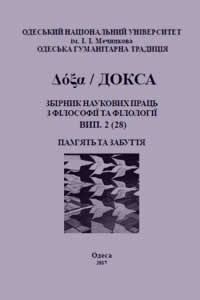TOTAL RECALL ПАУЛЯ ВЕРХУВЕНА: ПАМ’ЯТЬ, ІДЕНТИЧНІСТЬ І ЕРОЗІЯ РЕАЛЬНОСТІ
DOI:
https://doi.org/10.18524/2410-2601.2017.2(28).142064Ключові слова:
ерозія реальності, ідентичність, інтерпретація, кінематограф, метазнання, пам’ятьАнотація
Нідерландський кінорежисер Пауль Верхувен створює кінофільм Total Recall як «текст-письмо», чи «множинний текст» (у межах термінології Ролана Барта), тобто як текст, який відкритий для інтерпретацій. Таким чином йому вдається показати «ерозію реальності», яка відбувається в розумі головного персонажу кінофільму, Дугласа Куейда, зіграного Арнольдом Шварценеґґером. Тут ерозія реальності характеризується як порушення сприйняття реальності через втрату метазнання, тобто знання, яке супроводжує спогади, які складають людську ідентичність, і повідомляє, який спогад реальний, а який – ні.
Посилання
Barthes R. (2004). S / Z. Balzakovskiy tekst. (Opyit prochteniya) [S /Z. The Balzacian Text. The Reading Experience]. Moskva, Editorial URSS, 232 p.
Pavlov A. V. (2016). Rasskazhite vashim detyam: sto odinnadtsat opyitov o kultovom kinematografe [Tell Your Children: One Hundred and Eleven Essays on Cult Cinema]. Moskva, HSE Publishing House, 424 p.
Rayhert K. W. (2017). Poddelka vospominaniy, lichnosti i realnosti v rasskaze Filipa K. Dika “We Can Remember It for You Wholesale” [The Falsification of Memoirs, Personality and Reality in Philip K. Dick’s “We Can Remember It for You Wholesale”]. Δόξα / Doxa, Odesa, # 1 (27), pp. 240–250
Rayhert K. W. (2016). Telo, mediaustroystva i realnost v «Videodrome» i «Ekzistentsii» Devida Kronenberga [Body, Media-devices and Reality in David Cronenberg’s “Videodrome” and “eXistenZ”]. Aktualni problemy filosofiyi ta sociologiyi [Actual problems of philosophy and sociology], Odesa, #14, pp. 105–108.
Rayhert K. W. (2017). «Tyomnyiy gorod» Aleksa Proyasa v svete filosofii Filipa Kindreda Dika [Alex Proyas’ “The Dark City” in the Light of Philip Kindred Dick’s Philosophy]. Aktualni problemy filosofiyi ta sociologiyi [Actual problems of philosophy and sociology], Odesa, #15, pp. 112– 115.
Rayhert K.W. (2014). Filosofskie voprosyi Filipa Kindreda Dika [The Philip Kindred Dick’s Philosophical Questions]. Virtus, Rubizhne, #1, pp. 45–49.
Rayhert K. W. (2017). Eroziya realnosti v kinofilme «V pasti bezumiya» kinorezhissYora Dzhona Karpentera [The Erosion of Reality in John Carpenter’s “In the Mouth of Madness]. Aktualni Aktualni problemy
filosofiyi ta sociologiyi [Actual problems of philosophy and sociology], Odesa, #16, pp. 104–108.
Rayhert K. W. (2017). Eroziya realnosti v kinofilme Zaka Snaydera «Zapreschyonnyiy priyom» [The Reality Erosion in Zack Snyder’s “Sucker Punch”]. Visnyk of the Lviv University. Philosophical Political Studies, Lviv, #12, pp. 112–117.
Dick P. K. (1985). How to Build a Universe That Doesn’t Fall Apart Two Days Later. I Hope I Shall Arrive Soon & Other Stories. New York, Doubleday, pp. 4–16.
Dick P. K. (1966). We Can Remember It for You Wholesale. The Magazine of Fantasy and Science Fiction, Hoboken, # 4, pp. 4–23.
Fernandez-Menicucci A. (2014). Memories of Future Masculine Identities: A Comparison of Philip K. Dick’s “We Can Remember it for you Wholesale”, the 1990 Film Total Recall and its 2012 Remake. Between, Cagliari, # 8, pp. 1–25.
Glass F. (1990). Totally Recalling Arnold: Sex and Violence in the New Bad Future. Film Quarterly, Oakland, # 1, pp. 2–13.
Goldberg J. (1992). Recalling Totalities: The Mirrored Stages of Arnold Schwarzenegger. difference: A Journal of Feminist Cultural Studies, Providence, #1, pp. 172–204.
Grant B. K. (2016). Adventures in Perception: Endangering the Spectator in Science Fiction Movies. Endangering Science Fiction Film. Abingdon: Routledge, pp. 103–116.
Landsberg A. (1995). Prosthetic Memory: Total Recall and Blade Runner. Cyberspace / Cyberbodies / Cyberpunk: Cultures of Technological Embodiment. London, SAGE Publications, pp. 175–189.
Ndalianis A. (2001). Paul Verhoeven and His Hollow Men. Screening the Past, Melbourne, # 13, pp. 1–17.
Rose F. (2003). The Second Coming of Philip K. Dick. Wired. URL: https://www.wired.com/2003/12/philip (accessed 20.06.2017).
Rowlands M. (2012). Philosopher at the End of the Universe: Philosophy Explained Through Science Fiction Films. London, Ebury.
Rowlands M. (2005 ). Sci-Phi: Philosophy from Socrates to Schwarzenegger. New York, St. Martin’s Griffin.
Schmertz J. (1993). On Reading the Politics of Total Recall. Post Script, Commerce, # 12, pp. 34–42.
Vest J. P. (2007). Future Imperfect: Philip K. Dick at the Movies. Westport, Praeger.
Asada A. (2000). [Postmodern Obscene Negatives]. URL: http://www.kojinkaratani.com/criticalspace/old/special/asada/voice0007.html (accessed 11.06.2015) (jap).
##submission.downloads##
Опубліковано
Як цитувати
Номер
Розділ
Ліцензія
Авторське право (c) 2020 Докса

Ця робота ліцензується відповідно до Creative Commons Attribution-NonCommercial 4.0 International License.
Автори, які публікуються у цьому журналі, погоджуються з наступними умовами:
- Автори залишають за собою право на авторство своєї роботи та передають журналу право першої публікації цієї роботи на умовах ліцензії Attribution-NonCommercial 4.0 International (CC BY-NC 4.0).
- Автори мають право укладати самостійні додаткові угоди щодо неексклюзивного розповсюдження роботи у тому вигляді, в якому вона була опублікована цим журналом (наприклад, розміщувати роботу в електронному сховищі установи або публікувати у складі монографії), за умови збереження посилання на першу публікацію роботи у цьому журналі.
- Політика журналу дозволяє і заохочує розміщення авторами в мережі Інтернет (наприклад, у сховищах установ або на особистих веб-сайтах) роботи, оскільки це сприяє виникненню продуктивної наукової дискусії та позитивно позначається на оперативності та динаміці цитування опублікованої роботи (див. The Effect of Open Access).

